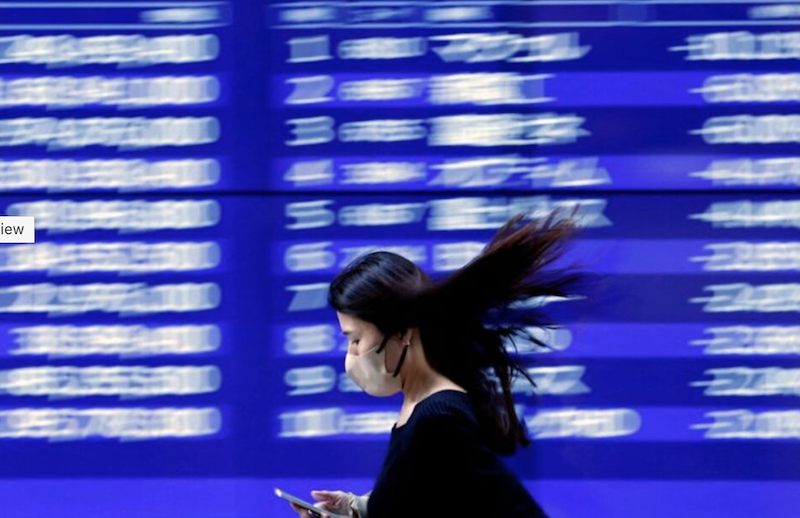Most Asian markets rose on Tuesday after a late surge in post-Easter holiday trading on Wall Street overnight.
There appears to be hope that interest rates will soon peak and fall later this year, even if the latest US jobs data causes a small additional rate hike in May by the US Federal Reserve.
Trading was largely sluggish as many markets reopened after a long holiday weekend.
The Kospi in South Korea jumped 1.42% after the central bank held rates steady for a second consecutive month, while the ASX 200 in Australia was up 1.26% on the back of positive developments that could resolve some key trade disputes with China.
Australian Foreign Minister Penny Wong announced an agreement with Beijing that seeks to end their row over barley imports in coming months, and she said the government expects a similar result in a second dispute on wine tariffs.
Japan’s Nikkei index also increased by over 1% following a report that US business guru Warren Buffett is considering further investment after news that the Berkshire Hathaway billionaire holds a 7.4% stake in five Japanese trading houses, including Itochu Corp.
Stocks in Tokyo were also buoyed by the dovish stance of Kazuo Ueda, the new Bank of Japan governor, who vowed on Monday to maintain the bank’s ultra-loose monetary policy.
ALSO SEE:
Consumer and Factory Prices Drop in China as Demand Sinks
Uneven recovery in China
The latest data in China showed the country’s post-Covid recovery has been mixed, with the services sector expanding further in March, but manufacturing hit by weak global demand.
Consumer inflation has fallen to an 18-month low, while factory-gate price declines increased in March, according to the National Bureau of Statistics. While that pointed to a deflationary situation in China, it also bolstered the case for global inflation easing further this year.
Also on Tuesday, China’s cyberspace regulator unveiled sweeping draft measures for managing generative artificial intelligence (AI) services.
Meanwhile, Ting Lu and other analysts at Nomura reported weakening momentum in new home sales, particularly in regions outside China’s top-tier cities.
“Pent-up demand for new home purchases appears to have subsided markedly in early April, mainly led by low-tier cities, following a short-lived sales rebound in March,” they said.
“The deposit rate cuts in several small local banks over the past weekend could be further evidence of deteriorating property markets in small cities, as small banks are facing mounting pressure from narrowing net interest margins amid weak household loan demand (especially for mortgages) and still-rising household deposits.”
A combination of these factors led to the Shanghai Composite edging down by 0.5%. However, the Hang Seng Index in Hong Kong rose by 0.76% and Shenzhen was marginally ahead at the close of trading.
Stocks rally as doubts ease
Elsewhere in Asia, stocks held their ground in Singapore, Malaysia and Taiwan, while the Nifty 50 in India was up by 0.56%.
The macro picture is still cloudy as investors await inflation data and corporate results that will shine a deeper light on the status of financial systems in the US and Europe.
Friday’s non-farm payrolls suggested labour markets remain resilient, boosting expectations for a 25-basis-point US rate increase in May. Markets price in a roughly 70% chance of a May hike, having last week priced such a move as a coin toss.
“It seems that we are currently in an environment that the world is looking at a soft landing and the need not to over-tighten policy,” Nordea chief analyst Jan von Gerich said.
“The payrolls number was strong enough to suggest that the economy could avoid a deeper recession but not too strong to suggest the Fed needs to tighten by much more.”
Traders still price in rate cuts by year-end as the economic growth outlook weakens, exacerbated by banking turmoil.
An analysis in the International Monetary Fund’s latest World Economic Outlook suggested that current high rates “are likely to be temporary” and predicted that, once inflation is brought under control, rates in advanced economies would eventually return to pre-pandemic levels.
The IMF’s latest global economic outlook is out later on Tuesday, while US inflation data for March, due on Wednesday, could provide the next steer for markets on the rate outlook.
“I don’t think the Fed should be hiking rates again but the reality is that they probably will do one more 25bp hike,” Guy Miller, chief market strategist at Zurich Insurance Group, said. “The reason for that is that core inflation is still running at high levels and the services sector is very robust.”
Fears on banking sector ease
Investor sentiment has also been boosted by signs that turmoil in the banking sector is easing.
Deposits at US commercial banks rose near the end of March for the first time in about a month, showing signs of stabilizing after the two largest bank failures since the financial crisis rocked the banking system and rattled depositors, Federal Reserve data on Friday showed.
In Europe, UBS shares rose just over 1% after JP Morgan raised its target price, while the Swiss parliament held an extraordinary session to discuss last month’s UBS-Credit Suisse deal.
In other news on Tuesday, the dollar slipped after three days of gains. It eased 0.4% to 133 yen, after jumping 1.1% on Monday. The euro was up 0.5% at $1.091.
Bitcoin touched a fresh 10-month high at $30,438 before pulling back to $30,148, after breaking free of recent ranges on Monday. The digital token had been stuck between about $26,500 and $29,400 for the previous three weeks.
Oil was back above $80 a barrel, and gold was edged up close to $2,000 an ounce.
- Jim Pollard with Reuters.
NOTE: This report was updated with further details on April 11, 2023.
ALSO SEE:
Beijing Unveils Sweeping Laws to Regulate ChatGPT-Like AI Tech
Baidu Sues Apple Over Ernie Bot Imposters
China’s Tencent Assembles Team To Create ChatGPT Rival
Tesla to Make Energy Storage Batteries at New Shanghai Plant
























